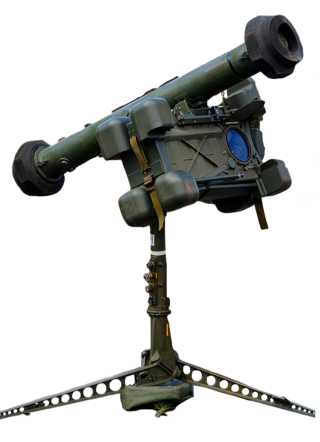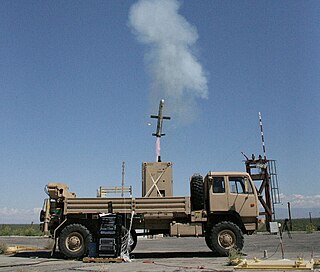Related Research Articles

RBS 70 is a man-portable air-defense system (MANPADS) designed for anti-aircraft warfare in all climate zones and with little to no support from other forces. Originally designed and manufactured by the Swedish defence firm of Bofors Defence. It uses the RB 70 missile, which is also in use in a number of other Swedish missile systems.

Israel Aerospace Industries, is Israel's major aerospace and aviation manufacturer, producing aerial and astronautic systems for both military and civilian usage. It has 14,000 employees as of 2021. IAI is state-owned by the government of Israel.

The IAI Heron (Machatz-1) is a medium-altitude long-endurance unmanned aerial vehicle (UAV) developed by the Malat (UAV) division of Israel Aerospace Industries. It is capable of Medium Altitude Long Endurance (MALE) operations of up to 52 hours' duration at up to 10.5 km (35,000 ft). It has demonstrated 52 hours of continuous flight, but the effective operational maximal flight duration is less, according to payload and flight profile. An advanced version, the Heron TP, is also known as the IAI Eitan.

The IAI Harpy is a loitering munition missile produced by Israel Aerospace Industries. The Harpy is designed to attack radar systems and is optimised for the suppression of enemy air defences (SEAD) role. It carries a high explosive warhead. The Harpy has been sold to several foreign nations, including South Korea, India and China.

The Non-Line of Sight Launch System (NLOS-LS) was a self-contained missile launcher system that was under development by NETFIRES LLC, a partnership between Lockheed Martin and Raytheon. Each Container Launch Unit (CLU) holds 15 missiles, and a self-locating networked communications system. CLUs can be linked for coordinated launching, with the missiles fired and controlled remotely via autonomous vertical launch. The weapon is roughly 2 metres tall.

Gabriel is a family of sea skimming anti-ship missiles manufactured by Israel Aerospace Industries (IAI). The initial variant of the missile was developed in the 1960s in response to the needs of the Israeli Navy which first deployed it in 1970. Since then, variants have been exported to navies around the world. The latest variant, the Gabriel V, is in use by the Finnish and Israeli navies as of 2020.

The IAI Searcher is a reconnaissance UAV developed in Israel in the 1980s. In the following decade, it replaced the IMI Mastiff and IAI Scout UAVs then in service with the Israeli Army.

The IAI Harop is a loitering munition developed by the MBT division of Israel Aerospace Industries. Loitering munitions are designed to loiter above the battlefield and attack targets by crashing into them and exploding.

The EL/W-2085 is an airborne early warning and control (AEW&C) multi-band radar system developed by Israel Aerospace Industries (IAI) and Elta Electronics Industries of Israel. Its primary objective is to provide intelligence to maintain air superiority and conduct surveillance. The system is currently in-service with Israel, Italy, and Singapore.

The Israel Aerospace Industries Panther is a tilt-rotor unmanned aerial vehicle (UAV) produced by Israel Aircraft Industries in Israel.

Barak 8, also known as LR-SAM or MR-SAM, is an Indo-Israeli jointly developed surface-to-air missile (SAM) system, designed to defend against any type of airborne threat including aircraft, helicopters, anti-ship missiles, and UAVs as well as ballistic missiles, cruise missiles and combat jets. Both maritime and land-based variants of the system exist.

The AeroVironment Switchblade is a miniature loitering munition designed by AeroVironment and used by several branches of the United States military. Small enough to fit in a backpack, the Switchblade launches from a tube, flies to the target area, and crashes into its target while detonating its explosive warhead. The name Switchblade comes from how the spring-loaded wings are folded inside a tube and flipped out once released.

The ELM-2084 is an Israeli ground-based mobile 3D AESA multi-mission radar (MMR) family produced by ELTA, a subsidiary of Israel Aerospace Industries.

The IAI Green Dragon is a loitering munition developed by the Israel Aerospace Industries. The drone is low cost that can loiter for 1.5 hours and a range of 40–50 km. It is munition itself with 3 kg warhead that can approach the target silently and hit with the effect of < 1m.

The IAI Rotem L or IAI Rotem - Light is a loitering munition developed by the Israel Aerospace Industries. The drone is a quadcopter that can loiter for 30–45 minutes with the maximum range of 10 km. It can carry 1 kg warhead that could be two fragmentation grenades.
A loitering munition, also known as a suicide drone, kamikaze drone, or exploding drone, is a kind of aerial weapon with a built-in warhead that is typically designed to loiter around a target area until a target is located, then attack the target by crashing into it. Loitering munitions enable faster reaction times against hidden targets that emerge for short periods without placing high-value platforms near the target area and also allow more selective targeting as the attack can be changed mid-flight or aborted.

The NCSIST Chien Hsiang is a Taiwanese anti-radiation loitering munition developed and produced by the National Chung-Shan Institute of Science and Technology.

The Albatross(Chinese: 銳鳶; pinyin: Ruì yuān,“Sharp Kite”), also known as the Chung Xiang II, is a medium unmanned aerial vehicle made by National Chung-Shan Institute of Science and Technology. It is in service with the Republic of China Navy.

The HESA Shahed 136, also known by its Russian designation Geran-2, is an Iranian-designed loitering munition, also referred to as a kamikaze drone or suicide drone, in the form of an autonomous pusher-propelled drone. It is designed and manufactured by the Iranian state-owned corporation HESA in association with Shahed Aviation Industries.

The Shahed 131, or Geran-1 in Russian service, is an Iranian-made exploding drone which came to prominence in October 2022 during the Russian invasion of Ukraine. It is powered by a Wankel engine model Shahed-783/788.
References
- ↑ "Harpy NG". IAI. Retrieved 2 September 2016.
- ↑ Zitun, Yoav (17 February 2016). "The missile that looks like a UAV". Y net news. Retrieved 2 September 2016.
- ↑ "Singapore Airshow 2016: IAI unveils three loitering systems". Jane’s. Retrieved 2 September 2016.
- ↑ "Singapore: IAI reveals new family of loitering munitions". Flight Global. Retrieved 2 September 2016.